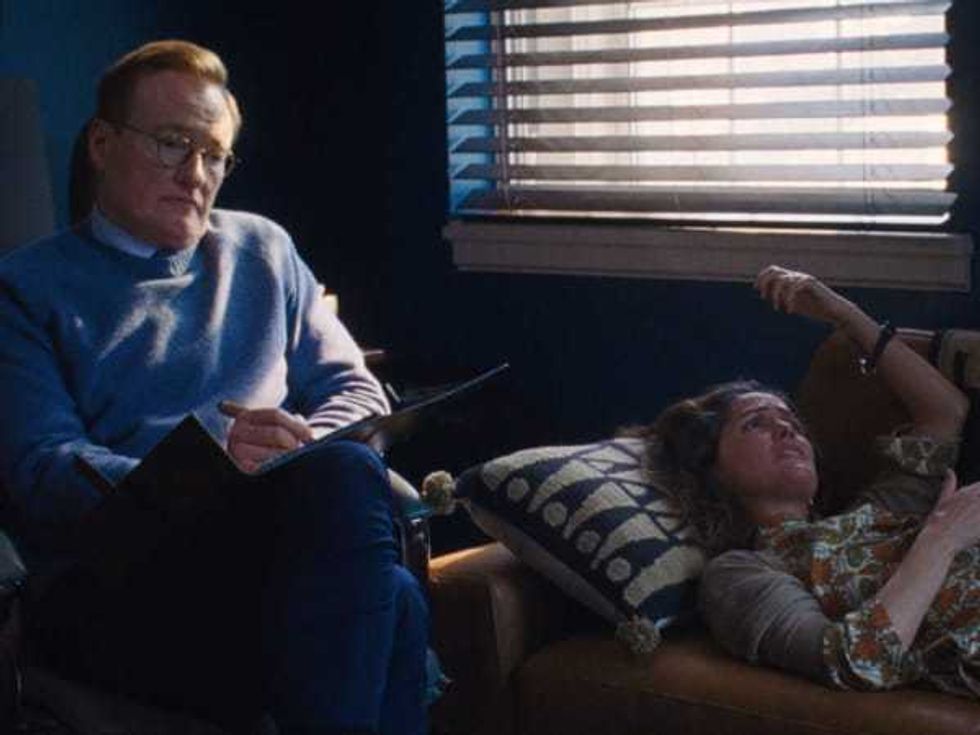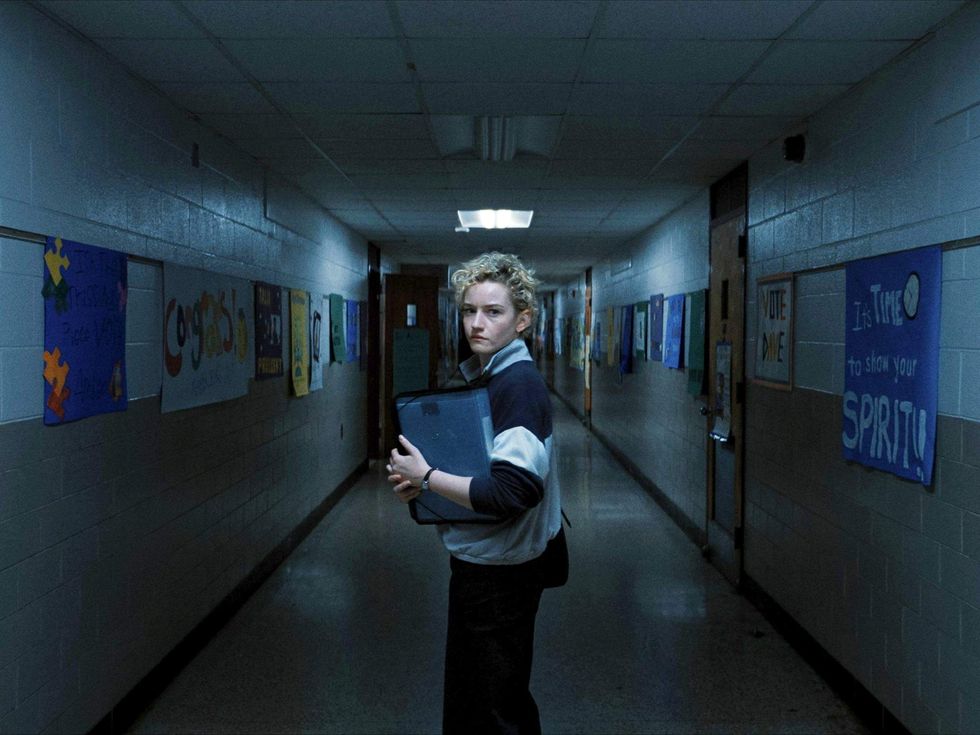An Oscar Winner's Prerogative
Shirley MacLaine makes her Cinema Arts moment right by insisting on showing thebest movie ever made in H-Town
 Debra Winger and Shirley MacLaine in the best movie ever made in Houston.
Debra Winger and Shirley MacLaine in the best movie ever made in Houston. Shirley MacLaine will be at Saturday's screening and do a post-movie Q&A.
Shirley MacLaine will be at Saturday's screening and do a post-movie Q&A.
 Jack Nicholson & Shirley MacLaine
Jack Nicholson & Shirley MacLaine Debra Winger and Jeff Daniels
Debra Winger and Jeff Daniels Having a little fun while driving in Terms of Endearment.
Having a little fun while driving in Terms of Endearment. The Terms of Endearment Room at Brennan's before the remodel
The Terms of Endearment Room at Brennan's before the remodel
When the good folks at the Cinema Arts Festival first approached Shirley MacLaine to appear at this year’s event — and to accept the festival’s 2010 Texas Film Award — they also asked her to choose a film for a special screening to mark the occasion. Her first and only choice: Terms of Endearment.
Which, when you stop to think about it, is an absolutely spot-on selection. First off, if you’re going to honor an actor with a Texas Film Award, and the actor inconveniently isn’t a native Texan, it’s probably a good idea to screen a movie in which the actor at least plays a Texan. And that’s exactly what MacLaine did — brilliantly, unforgettably, Oscar-worthily — in writer-director James L. Brooks' Academy Award-winning adaptation of Larry McMurtry's acclaimed novel.
But there’s another, even better reason why Terms of Endearment — which will be shown at 7 p.m. Saturday at the Museum of Fine Arts, Houston, with MacLaine in attendance for a post-screening Q&A — is not just a great choice, it’s the perfect choice for a Houston-based film event. This extraordinary 1983 dramedy is, quite simply, the best movie ever made in H-Town.
(Bill Forsyth’s Local Hero comes close, to be sure, but most of that flick actually was shot in Scotland.)
And even though it’s been readily available for nearly three decades on cable, broadcast TV and various forms of home-video, you really it owe it to yourself to see Terms of Endearment — especially if you’re seeing it for the first time — the way God intended you to see it, up on the big screen.
If this indeed will be your first exposure to Brooks’ 1983 classic, prepare yourself for a treat: Terms of Endearment is an exceptionally satisfying and altogether wonderful piece of work, blessed with the ability to make you cry a little and laugh a lot. True, there is a slight but detectable jaggedness to the first half-hour, as the film hops from incident to incident a mite too briskly. But then the film settles down, and Brooks opts for a more deliberate pace, so that, by the end, we're convinced we have been drawn into the natural rhythms of life itself, with its ebb and flow of joys and disappointments.
(With all due respect to Larry McMurtry, the bittersweet ending here seems much more logical, and far less contrived, than it does in the original novel.)
And long before the finale, we come to realize that the title refers not to sweet nothings, but rather to the unwritten rules and painful responsibilities that all forms of love entail. Terms of Endearment is a specifically Houston-set story — but the verities revealed here are universal.
The primary focus is the relationship shared by Aurora Greenway (MacLaine), a vainglorious but vulnerable widow who holds court in River Oaks, and Emma (Debra Winger), her daughter, a woman with her own streak of independence. We follow Aurora and Emma through some 30 years of tempestuous love-hate, starting with Emma's infancy and ending with a teary bedside vigil.
For the bulk of the film, though, we see their lives unfold in parallel lines, with Aurora remaining equal parts middle-aged coquette and brassy aristocrat in Houston, while Emma moves with her husband (Jeff Daniels) and children to his teaching jobs in Iowa and Nebraska.
Debra Winger is remarkably effective and affecting as Emma, never making a false step as she evolves from giddy teen-ager to ruefully wise adult. Better still, she manages — with the help of Brooks' script — to make Emma less of a wimp than she is in McMurtry's book. It's easy to believe this character, long overshadowed by a flamboyant mother, would be racked with self-doubt. But Winger shows us how Emma compensates, and how much steel there is beneath her marshmallow exterior.
MacLaine, of course, received a much-deserved Best Actress trophy for playing Aurora, giving the performance of her career — so far — in the role of a lifetime. She makes the grand lady of River Oaks a haughty matron with a heart of mush, and a rogue streak of impetuous passion. Better still, she is splendidly well matched with another Oscar-winner, Jack Nicholson, who steals scenes just as deftly as his character — Aurora's next-door lover, a hell-raising ex-astronaut named Garrett Breedlove — steals Aurora’s heart.
(Brooks takes a somewhat, ahem, imaginative approach to local geography during a sequence that has Aurora and Garrett passing through Galveston while driving back to River Oaks from lunch at a Brennan’s Restaurant downtown. But never mind: The spirited give-and-take between the two stars is so hilarious, you want it to last. So, really, you don’t care that they take the long way home.)
Terms of Endearment is all about the things we do for love, and the things we have to do because we love. It's also a celebration of love in all its variations. Even an adulterous affair between Emma and a pleasant middle-aged banker (beautifully played by John Lithgow, who delivers one of the greatest Yankee-dissing putdowns in movie history) has an air of sweet tenderness, if only because the lovers are truly nurturing each other and sharing something important, however ephemeral.
When the affair must end, and the banker shyly asks for a picture to remember Emma by, Brooks gently nudges us to recognize his overarching theme: Every love leaves its mark. That's one of the many terms of endearment.
(It should be noted, by the way, that MacLaine gamely repeated her portrayal of Aurora Greenway in The Evening Star, an uneven 1996 sequel — also filmed in Houston — that’s appreciably better than its reputation suggests. Lightning did not strike twice, of course. But then again, it seldom does.)











